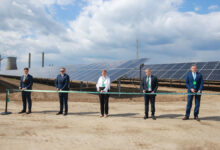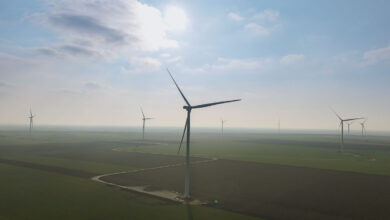New Code of Good Practice for Renewable Energy in Romania
The second edition of the ‘Code of Good Practice for Renewable Energy in Romania’ is a joint project of the Romanian Wind Energy Association (RWEA) and the Romanian Photovoltaic Industry Association (RPIA) with the participation of DG ENER, the Romanian Ministry of Energy, the Romanian Energy Regulatory Authority (ANRE), Transelectrica, SolarPower Europe, WindEurope, Federation of Associations of Energy Utility Companies (ACUE), European Investment Bank (EIB), EBRD, National Bank of Romania, Energy Policy Group, DLA Piper and many other experts in energy, technology, communication, legislation, and regulations.
This comprehensive guide for the renewable industry is endorsed by key industry players at local and international level and includes market analyses, interviews, opinions, and case studies, showing the need to accelerate investment in the sector.
The first code of good practice was launched in 2021 and it was full of useful information regarding the status of the renewable market, national & European legislation, permitting process and available funding. It was intended to guide investors in the process of installing wind and solar parks in Romania, from permits and the relationship with the community, to grid connection and repowering. Also, to send a proposal for collaboration to the public authorities, suggesting ways to integrate European ambitions in Romania’s national plans, for the general benefit of the economy and population. Last but not least, it was aimed at encouraging the development of related industries and attracting new players to the national production and service chain.
As a member of the EU, Romania must align itself with the bloc’s effort to achieve climate neutrality by 2050. Yet, the level of ambition remains low, as the expected-to-be-updated national target will still be below the natural potential of the country.
The current revision of the National Energy and Climate Plans offers a proper avenue to set more ambitious national targets and accelerate the development and commissioning of new renewable energy capacity.
The statement provided by Mechthild Wörsdörfer, Deputy Director-General DG Energy regarding the code of good practice for renewable energy shows that Romania’s share of renewable energy to contribute to the EU’s 2030 renewable energy target requires more ambition. It also offers an overview of the clean energy transition and the key role that renewable energy will play in the future in Romania and the whole of the European Union.
“Romania needs to set more ambitious national targets and accelerate the development and commissioning of new energy capacities from renewable sources. The current review of the National Energy and Climate Plans is the perfect opportunity for this. The Commission encourages Romania to review its contribution to be in line with the EU’s increased 2030 renewable energy target and to put in place policies and measures that are sufficient to achieve this revised national target,” Mechthild Wörsdörfer underlined.
During the launch event several topics of interest – including legislation modifications, grid connection process, PPAs, CfDs & other funding, role of storage & hydrogen, recycling, and circular economy within the renewable sector, have been discussed.
“Romania is currently in the midst of an energy revolution, and we stand among the nations with an ambitious decarbonization agenda. Presently, 14% of our energy is sourced from coal, but by 2026, that figure is projected to drop to a mere 0.3%. In this transformative journey, we must confront various challenges, including the impact on employment, as evidenced by my conversations with miners in Valea Jiului,” Romanian Minister of Energy Sebastian Burduja said.
“Yet, this transition to cleaner energy sources also ushers in a wave of opportunities that we, both in the public and private sectors, must seize collectively. The Ministry of Energy shoulders a significant responsibility in ensuring the prudent utilization of available funds. I personally oversee the progress of contract signing for Investment 1 of the NRRP, and we’ve taken measures to ensure transparency in this process, maintaining a publicly accessible list that chronicles the status of applications. Together, we are charting a course towards a greener and more sustainable future,” he added.
The Code is a comprehensive document that provides an up-to-date perspective on the energy sector in the national and regional context, on the development of wind and solar projects, and not least on sustainable financing opportunities and best practices. ANRE President George Niculescu reiterated the Authority’s openness to support investments in the renewable energy sector, but also stressed that, as ANRE President, he puts consumers’ interests first. “Legislation should set a threshold of installed power for prosumers’ electricity production capacities, according to their consumption, as there are more and more cases of Romanians installing photovoltaic panels on roofs with a capacity much higher than the consumption of their homes. (…) I have encouraged and continue to believe in the role of prosumers as an energy efficiency measure. I still believe that, if we want to reduce our utility bills, we must resort to the installation of photovoltaic panels by household consumers,” the ANRE president added.
“In order for Romania to realise its renewable potential, it requires an investor friendly renewable climate, one that allows faster permitting approval procedures, that removes grid connection bottlenecks and provides revenue stabilisation mechanism such as the proposed CfD scheme that is currently under implementation. In addition, reforms that will allow the transferability and export of Certificates of Origin could also provide broader routes to market for investors,” George Gkiaouris, Regional Head, Energy SEE at EBRD, mentioned.
“Taking into account the ongoing projects and the restrictions imposed by the need for grid reinforcements, we estimate that in the next three years 2500 MW can be installed in CEF and 500 MW in CEE, without taking into account the installed capacity at prosumers. The development of renewable power plants is linked to the evolution of electricity consumption, which has been declining in recent years, amid the pandemic and the energy crisis, but also to the development of storage facilities,” said Stefanita Munteanu, CEO of Transelectrica.
A first assessment by ACUE members shows that at least a tripling of investments in distribution networks is needed to achieve Romania’s binding 2030 targets. Grids are vital for the energy transition and must facilitate the uptake of clean energy. And the future of clean energy can be secured through financing solutions built in a balanced mix of operators’ own sources, attracted sources and European funds made available to the grids that relieve pressure on tariffs: “We are talking about predictability and optimisation. About cutting the red tape and streamlining the way authorities work with EU funds. The transition is happening. This is the direction, and we need to discuss how to make it affordable for customers,” said Dana Raluca Daraban, Executive Director of ACUE, at the launch of the second edition of the Code of Best Practice for Renewable Energy.
“At the same time, the trend of consumers becoming prosumers in large numbers is a good and desirable one. But for grids to be able to take on as many prosumers as possible, it is necessary to create a clear and simple regulation for their connection, coordinate and prioritize investments in networks, adjust capacities to consumption requirements and standardize equipment, encourage storage, and stimulate investments in networks that can manage active consumers,” Daniela Daraban added.
The new code of good practice for renewable energy in Romania benefits from the contribution of TotalEnergies, JinkoSolar, Engie Romania, CEZ Romania, K2 Systems, Enel Green Power Romania, Aukera, PNE AG, Monsson, Alive Capital, Banca Transilvania, BCR, Huawei, OX2, WPD, Vlasceanu & Partners, DLA Piper Romania, Parapet, Monsson, Lidl Romania.







